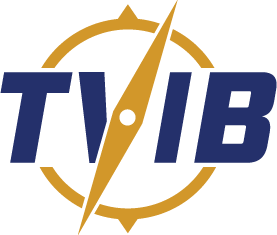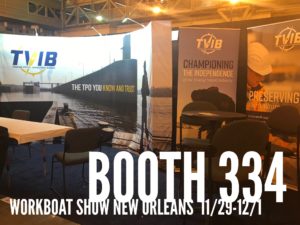TVIB TALKS: Top 10 Advantages of the TSMS Option
 At the 2017 International WorkBoat Show, Chris Parsonage, TVIB President, presented on a panel discussing the TSMS option versus the U.S. Coast Guard Inspection option for Subchapter M compliance. Following is the first in a series of posts from that presentation.
At the 2017 International WorkBoat Show, Chris Parsonage, TVIB President, presented on a panel discussing the TSMS option versus the U.S. Coast Guard Inspection option for Subchapter M compliance. Following is the first in a series of posts from that presentation.
Top Ten Advantages of the TSMS Option
- Greater flexibility for scheduling audits and surveys to fit a companies operating schedules.
- Companies utilizing a TPO approved TSMS will be perceived as operating at a higher level of performance by their customers.
- Operators subject to the TMSA requirements or the AWO RCP are already required to have an audited TSMS regardless of compliance option selected.
- Every Operator will eventually need a Health and Safety plan regardless of Coast Guard option or TSMS option selected.
- Internal Survey Option
- The internal survey option provides the company an alternative to conduct annual compliance surveys and five-year drydock surveys and ISEs, utilizing company personnel (or contracted surveyors), versus having to use third-party surveyors.
- Surveys can be conducted during normal maintenance operations.
- Companies can determine in their TPO approved TSMS, how they intend to comply with vessel requirements.
- Properly drafted Permit to Proceed procedures will be defined by the company and should allow greater ability to continue operations when minor deficiencies occur during operations.
- The ability to use a Corrective Action process to correct non-conformities and deficiencies under the supervision of a TPO will allow greater flexibility to schedule repairs than might be available under Coast Guard inspections.
- Potential for a lower fee for each annual Coast Guard COI renewal.
- The Coast Guard will be completing a rulemaking to align inspection and COI renewal fees to recognize the amount of work and costs related to Coast Guard inspections for towing vessels using the Coast Guard option vessels that required for the TSMS Option vessels under TPO supervision.
- One Coast Guard inspection in five years with the TSMS option, versus one every year with the Coast Guard option.
- A TSMS should create a culture of safety and continuous improvement, as opposed to a culture of compliance.
- The Coast Guard has given great latitude to TPOs to determine how an owner/operator can comply with Subchapter M.

